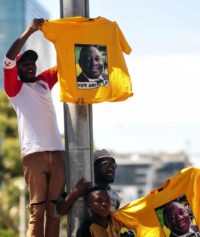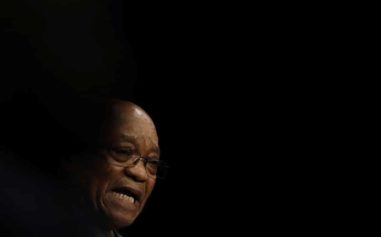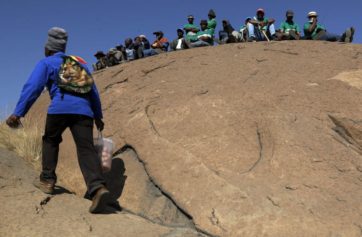The fallout from the South African mining massacre has reached a preposterous level, as 270 miners who were jailed during the deadly protest have now been charged with the murder of their 34 colleagues who were shot by police.
The bizarre decision actually has precedence in South Africa during the apartheid era, when black South Africans were charged with crimes that were committed by others. The state prosecutors in this case used something called the “common purpose” doctrine, which is similar to charging someone for being a member of a mob.
The decision has been condemned by constitutional lawyers.
South Africans have reacted with “a sense of shock, panic and confusion” according to the nation’s justice minister, Jeff Radebe.
Radebe said that the constitution gives the justice minister the right to “exercise final responsibility over the prosecuting authority.” So he said he has asked the head of the National Prosecuting Authority (NPA) “to furnish me with a report explaining the rationale behind such a decision.”
The massacre of 34 miners occurred two weeks ago, when police opened fire on the miners during a strike at the Marikana mine, owned by Lonmin, the world’s third largest platinum producer. In South Africa and around the globe, the reaction was horror and outrage.
Police claim they opened fire after being threatened by a crowd of protesters who advanced towards them with machetes. The 270 miners were arrested during the ensuing melee. Six of them remain in the hospital.
They were charged on Thursday, with the prosecutors arguing they were part of the crowd whose actions provoked the police into opening fire.
A group of lawyers who represent the 270 miners wrote to President Jacob Zuma, demanding the release of their clients by 13:00 on Sunday.
If they weren’t released, the lawyers warned that they would apply to the South African high court to order the miners’ release.
At the same time as the state is charging the jailed miners, the country’s independent police watchdog has refused to comment on reports citing leaked details of post-mortem examinations suggesting miners were shot in the back.
Former African National Congress (ANC) youth leader Julius Malema, who was thrown out of the ANC after public disagreements with President Zuma, called the decision “madness.”
“The policemen who killed those people are not in custody, not even one of them. This is madness,” he said.
Lawyers seemed shocked that the country would still invoke the “common purpose” doctrine nearly two decades after apartheid. South African lawyer Jay Surju told the BBC’s Focus on Africa that the doctrine was “outdated and infamous.”
“It was discredited during the time of apartheid,” he said.
Constitutional lawyer Pierre de Vos called the murder charges “a flagrant abuse of the criminal justice system.”
On the day that thousands of mourners attended a memorial service for the slain men, about seventy or so miles away the pain was palpable among those who live in South Africa, based on interviews conducted in South Africa by Atlanta Black Star.
“It is very sad and scary,” Thokozani Mdluli, a local tour guide, told atlantablackstar.com. “Immediately, these killings made me think back to apartheid. In fact, it’s just like apartheid. Here we have workers protesting peacefully for higher pay—which is their right, especially with how hard they work and the danger that comes with the job—and they get killed. Shot.
“It made me think back to the 69 people who were killed in 1960 for objecting to the laws that required them to carry an identity card on them at all times or be jailed. Shot down in cold blood.”


